

Assignment 3. Assignment 2. Are Bureaucratic and Scientific methods of Management out of date? The ideas of the classical theorists, particularly those of bureaucracy and scientific management, are generally considered as rather old fashioned and out of date, and of little relevance to work and organisation today.
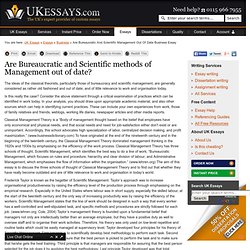
Is this really the case? Consider the above statement through a critical examination of practices which can be identified in work today. In your analysis, you should draw upon appropriate academic material, and also other sources which can help in identifying current practices. These can include your own experiences from work, those of family relatives and friends, weblogs, working life diaries, newspaper articles and other media reports.
Classical Management Theory is a “Body of management thought based on the belief that employees have only economical and physical needs, and that social needs and need for job-satisfaction either don't exist or are unimportant. Are Bureaucratic and Scientific methods of Management out of date? Is bureaucracy still relevant to contemporary organisation? Bureaucracy is supposedly unsuitable to quickly changing and highly demanding features of contemporary organizations as this type of management is synonymous to red tape and it represents dozens of negative effects such as rigidity, alienation, and low commitment (Adler, 1999, pp.37).
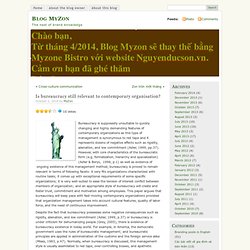
However, with core characteristics of the bureaucratic form (e.g. formalization, hierarchy and specialization) (Adler & Borys, 1996, p.1) as well as evidence of ongoing existence of this management method, bureaucracy is proved to remain relevant in terms of following facets: it very fits organizations characterized with routine tasks; it comes up with exceptional requirements of some specific organizations; it is very well-suited to ease the tension of interest conflict between members of organization; and an appropriate style of bureaucracy will create and foster trust, commitment and motivation among employees. References Adler, P, S 1999 . Adler, P, S & Borys, B 1996 . Classical Schools of Management. One of the first schools of management thought, the classical management theory, developed during the Industrial Revolution when new problems related to the factory system began to appear.

Managers were unsure of how to train employees (many of them non‐English speaking immigrants) or deal with increased labor dissatisfaction, so they began to test solutions. As a result, the classical management theory developed from efforts to find the “one best way” to perform and manage tasks. This school of thought is made up of two branches: classical scientific and classical administrative, described in the following sections.
The classical scientific branch arose because of the need to increase productivity and efficiency. The emphasis was on trying to find the best way to get the most work done by examining how the work process was actually accomplished and by scrutinizing the skills of the workforce. F. W. Taylor’s Scientific Management Theory in Modern Day Workplace. Management can have the most remarkable effects on organization; that is why management has become an essential part of organization.
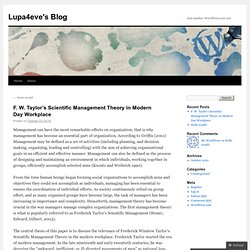
According to Griffin (2001) Management may be defined as a set of activities (including planning, and decision making, organizing, leading and controlling) with the aim of achieving organizational goals in an efficient and effective manner. Management can also be defined as the process of designing and maintaining an environment in which individuals, working together in groups, efficiently accomplish selected aims (Koontz and Weihrich 1990). From the time human beings began forming social organizations to accomplish aims and objectives they could not accomplish as individuals, managing has been essential to ensure the coordination of individual efforts. As society continuously relied on group effort, and as many organized groups have become large, the task of managers has been increasing in importance and complexity. 1. 2. 3. 4. References. Henry Fayol's 14 principles in Management. Henry Fayol's 14 Principles of Management August 6,20102 all types of work.

Each job and work should be assigned tothe specialist of his job. Division of work promotesefficiency because it permits an organizational member towork in a limited area reducing the scope of hisresponsibility. Fayol wanted the division of work not onlyat factory but at management levels also.2. Au. Henri Fayol's Principles of Management - From MindTools.com. Early Management Theory Fayol's "14 principles" were first published in 1914, but are still relevant to today's managers. © iStockphoto/gehringj Today's managers have access to an amazing array of resources which they can use to improve their skills.

But what about those managers who were leading the way forward 100 years ago? Managers in the early 1900s had very few external resources to draw upon to guide and develop their management practice. Background. Henri Fayol Fredrick Taylor Max Weber Management by Robert Grice. Robert Grice's image for: "Henri Fayol Fredrick Taylor Max Weber Management" Caption: Location:

Brief note on the concept of Bureaucracy as conceptualized by Max Weber. The concept of bureaucracy was developed by a social scientist, Max Weber.

Max Weber {1864-1920) was a German Sociologist. Weber's news on organizational design were influenced by three factors, namely (i) his military experience, (ii) his lack of trust in human judgment, and (iii) the phenomenal growth of industrial organizations. He conceived of bureaucracy as an abstract system for rational solution of management problems without the frictions caused by human errors and emotions. According to Weber, "bureaucratic organizations are the most rational means of carrying out imperative control over human beings".' The theory of bureaucracy is based upon the nature of authority relationships in organisation. Weber visualized the bureaucratic model as an orderly structuring of power to achieve rational human behavior under a hierarchy of professionals. (i) Traditional authority: (ii) Charismatic authority: (iii) Rational-legal authority: Bureaucracy — Max Weber's six characteristics of the bureaucratic form. Before covering Weber's Six Major Principles, I want to describe the various multiple meanings of the word "bureaucracy.
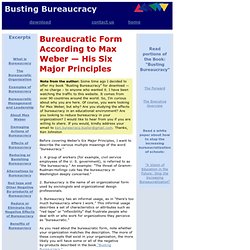
" 1. A group of workers (for example, civil service employees of the U. S. government), is referred to as "the bureaucracy. " An example: "The threat of Gramm-Rudman-Hollings cuts has the bureaucracy in Washington deeply concerned. " 2. 3. As you read about the bureaucratic form, note whether your organization matches the description. In the 1930s Max Weber, a German sociologist, wrote a rationale that described the bureaucratic form as being the ideal way of organizing government agencies. Max Weber - Bureaucracy. Weber's interest in the nature of power and authority, as well as his pervasive preoccupation with modern trends of rationalization, led him to concern himself with the operation of modern large-scale enterprises in the political, administrative, and economic realm.
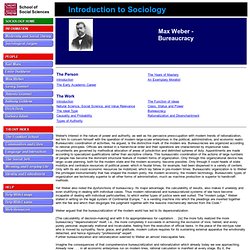
Bureaucratic coordination of activities, he argued, is the distinctive mark of the modern era. Bureaucracies are organized according to rational principles. Offices are ranked in a hierarchical order and their operations are characterized by impersonal rules. Administration management. NHS Careers > Explore by career > Management > Careers in management > Operational management > Administration management There are a variety of managerial roles working in administration.
Administration manager You would be responsible for providing a high quality senior personal assistant (PA) service to the chief executive and chair of the organisation. You will also help the trust board secretary in effectively supporting the board and executive committee structure. The role include leading and co-ordinating the work of director-level PAs to ensure that office functions were managed effectively.
You would need experience in a senior PA or office manager role, preferably within the NHS or public sector. General office manager Youw would provide managerial and administrative support at a NHS organisation by managing the day to day function of the administrative and non-clinical services. Entry requirements Further information. Business-Managed Culture - Increasing Productivity - Spread of Scientific Management. Business-Managed Culture Reference: Frederick Winslow Taylor, ‘The Principles of Scientific Management’, in Scientific Management (Westport, Connecticut: Greenwood Press, 1911), p. 28; Ed Andrew, Closing the Iron Cage: The scientific management of work and leisure (Montréal: Black Rose Books, 1981), pp. 58, 72.
At the time that The Principles of Scientific Management was published in 1911, Taylor claimed that more than 50,000 workers were subject to scientific management in the US. Specialization Definition. What is time and motion study? definition and meaning. Scientific Management: Theories, Principles & Definition. Scientific management theory was developed in the early 20th century by Frederick W. Taylor. We will be exploring the primary principles of scientific management and some of its key contributors. You will also be given a chance to reinforce your knowledge with a short quiz. Why It Is Important Scientific management theory is important because its approach to management is found in almost every industrial business operation across the world, and its influence is felt in general business practices such planning, process design, quality control, cost accounting, and ergonomics.
Theorists The founding father of scientific management theory is Frederick W. The husband and wife team of Frank Gilbreth, Sr. and Lillian Moller Gilbreth contributed to the theory. Frederick Winslow Taylor (1856-1915)